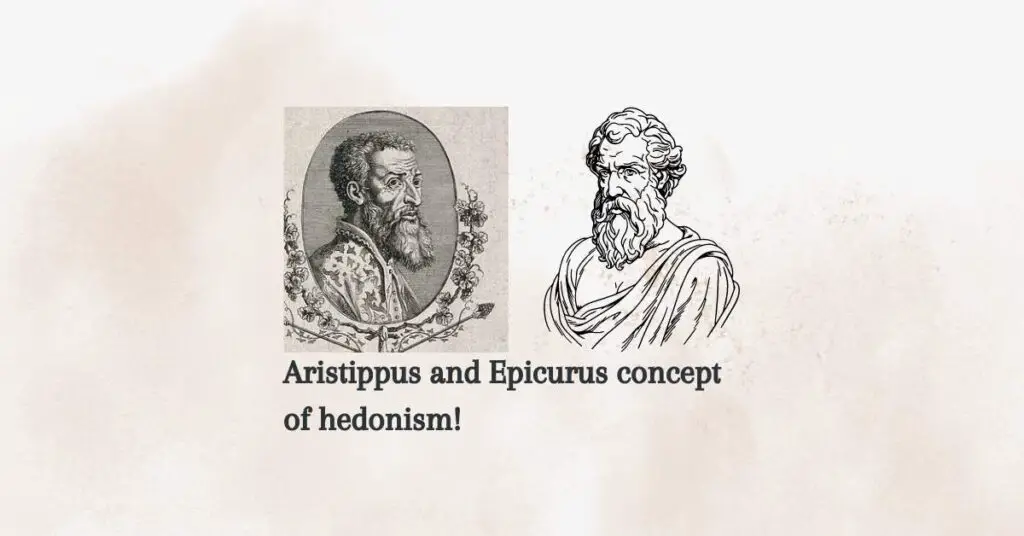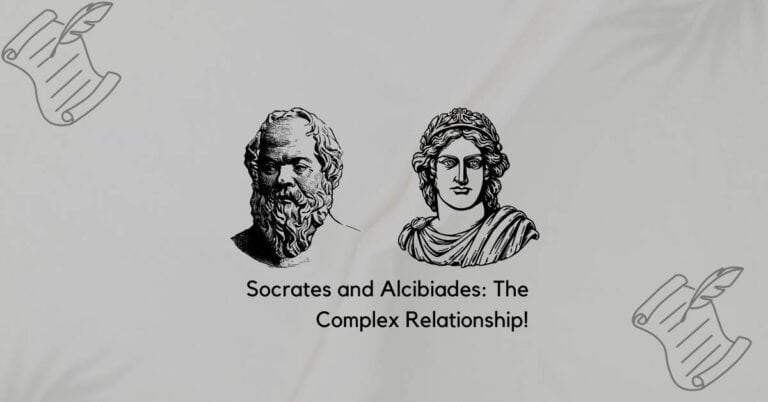Aristippus and Epicurus’ concept of hedonism: 2 Types of Pleasure!
Ever feel like happiness is a mystery wrapped in an enigma dipped in mystery sauce? Yeah, us, too. That’s why those brainy Ancient Greeks were like, “Hold my olive oil!” and started exploring philosophies about achieving the good life.
One such philosophy is Aristippus and Epicurus’ concept of hedonism, which boils down to finding happiness through Pleasure.
Now, before you picture toga parties on repeat (not that there’s anything wrong with a good toga!), these ancient philosophers had some surprisingly sophisticated ideas about what real Pleasure is and how to snag it.
We’re talking way more than just gorging at buffets (although, hey, a good meal can definitely spark joy). Let’s ditch the beach blanket for a second and dive into their fascinating (and sometimes mind-blowing) take on hedonism.
Who is the father of hedonism?
While the concept of Pleasure as a desirable state has been pondered by thinkers throughout history, the title of “father of hedonism” is most often attributed to Aristippus of Cyrene.
Living in Ancient Greece during the 4th century BCE, Aristippus wasn’t the first to find Pleasure appealing. However, he’s credited with taking these scattered ideas and forging them into a more formal philosophical system.
Aristippus argued that Pleasure, particularly physical gratification, was the highest good humans should strive for. He even studied under Socrates, a prominent philosopher who focused on virtue and knowledge.
However, Aristippus diverged from his teacher’s path, believing that pursuing Pleasure, not necessarily moral virtue, led to a happy and fulfilled life. This core principle—Pleasure as the ultimate goal—became the foundation of what we now know as hedonism.
Importance of Aristippus and Epicurus’ concept of hedonism:
Aristippus on Hedonism: Finding Pleasure in the Present Moment
- A. Core principle: Pleasure as the ultimate good:
Aristippus’s concept of hedonism stands out for its emphasis on finding Pleasure in the present moment.
He believed that Pleasure, particularly from bodily experiences like good food and physical comfort, is the ultimate good.
This focus on immediate gratification challenged the traditional view of good being tied to external factors like social status or virtue.
- B. Detachment from external circumstances:
However, Aristippus’ hedonism wasn’t simply about indulging in every impulse.
He advocated for a detachment from external circumstances, prioritizing one’s inner experience of Pleasure. This meant being adaptable and resourceful, finding enjoyment regardless of the situation.
- C. Criticism of Aristippus’ Hedonism:
While intriguing, Aristippus’s concept of hedonism has faced some key criticisms. One major concern is that his emphasis on immediate Pleasure could lead to impulsive and potentially immoral actions.
Critics argue that focusing solely on the moment’s gratification might disregard the future consequences of one’s actions. For example, someone following Aristippus’s philosophy might indulge in excessive spending, neglecting future financial security, simply to experience the immediate Pleasure of a luxury purchase.
Furthermore, focusing on bodily pleasures could promote a disregard for moral principles.
Imagine a scenario where someone prioritizes their physical comfort over helping someone in need.
Critics suggest such a hedonistic philosophy could lead to a society focused solely on self-gratification, neglecting the importance of social responsibility and ethical behavior.
Epicurus on Hedonism: A Calmer Path
- A. Pleasure as freedom from pain and fear:
Epicurus, another prominent figure in ancient hedonism, offered a distinct perspective compared to Aristippus.
While both agreed that Pleasure is the ultimate good, Epicurus defined Pleasure quite differently. He believed that true Pleasure wasn’t found in the intense pursuit of bodily sensations but rather in achieving a state of ataraxia (tranquility) and aponia (absence of pain).
Think about a life free from constant worry, anxieties, and physical discomfort. According to Epicurus, this state of inner peace was the highest form of Pleasure.
Here’s how this concept works:
Ataraxia (tranquility): This refers to a state of freedom from mental disturbances like fear, worry, and desires that can cause anxiety. Epicurus believed that achieving a state of mental calmness was essential for true happiness.
Aponia (absence of pain): This involves minimizing physical discomfort. It doesn’t necessarily mean a complete lack of pain but rather avoiding unnecessary suffering and living a life free from major physical ailments.
Epicurus offered a more balanced and potentially sustainable approach to hedonism than Aristippus’ emphasis on fleeting pleasures by focusing on ataraxia and aponia.
- B. Moderation and prudence:
Epicurus’s concept of hedonism stands in stark contrast to the impulsive gratification often associated with hedonism. His philosophy emphasizes Moderation and prudence as the key ingredients for achieving a life filled with sustainable enjoyment.
Epicurus argued that prioritizing simple pleasures readily available and causing no harm is far more reliable than chasing extravagant experiences.
Imagine the satisfaction of a delicious but simple meal shared with loved ones, the joy of a conversation with friends, or the tranquility found in appreciating nature’s beauty.
These experiences, according to Epicurus’s hedonism, provide a more dependable source of happiness compared to the fleeting highs of extravagance. Furthermore, Epicurus stressed the importance of prudence. This involves using reason to evaluate desires carefully.
Would fulfilling this desire bring genuine Pleasure, or will it ultimately lead to suffering? For instance, indulging in a luxurious feast might bring temporary satisfaction but could lead to financial strain or health issues down the line.
By employing reason to assess desires, one can avoid unnecessary suffering and cultivate a more sustainable form of Pleasure.
Through Moderation and prudence, Epicurus’s concept of hedonism offers a practical roadmap for achieving a life of tranquility and enjoyment, ensuring long-term well-being over short-lived thrills.
- C. Importance of Friendship and Wisdom: The Pillars of Epicurean Hedonism
Epicurus’s concept of hedonism extends far beyond simply seeking personal Pleasure. He recognized the crucial role of friendship and wisdom in achieving a truly fulfilling life.
Friendship: Building meaningful relationships with others was central to Epicurus’s philosophy. He believed that strong friendships provided a source of constant joy, security, and support. Imagine a circle of close friends, offering laughter, companionship, and a sense of belonging. This sense of community, according to Epicurus’s hedonism, contributes significantly to long-lasting happiness.
Wisdom: Epicurus emphasized the importance of wisdom. He believed that knowledge was essential for managing desires and anxieties, both of which could hinder one’s pursuit of tranquility.
Understanding the natural world, one’s own limitations and the true sources of Pleasure could help individuals make informed decisions and avoid unnecessary suffering.
For example, by understanding the fleeting nature of material possessions, one could avoid the anxiety and disappointment that comes from chasing them relentlessly.
Through strong friendships and the pursuit of wisdom, Epicurus’s concept of hedonism provides a well-rounded approach to achieving a life filled with lasting joy and inner peace.
- D. Distinction from Aristippus: The Path to Tranquility vs. Immediate Gratification
While both Aristippus and Epicurus fall under the umbrella of hedonism, their approaches differ significantly.
Aristippus, as discussed earlier, focused on the immediate gratification of bodily pleasures. His concept of hedonism centered on enjoying the present moment, often through physical sensations like good food or comfortable surroundings.
In contrast, Epicurus’s concept of hedonism emphasizes achieving long-term well-being over fleeting pleasures. He believed that true happiness comes from a state of tranquility and freedom from pain and fear (ataraxia and aponia).
This can be achieved through Moderation, prudence, cultivating meaningful relationships, and pursuing knowledge.
Here’s an analogy: Imagine two paths. Aristippus’s path is a rollercoaster ride, filled with exhilarating highs and inevitable lows.
Epicurus’s path, on the other hand, is a gentle stroll through a peaceful garden, offering a sense of calm and lasting contentment.
Difference between Aristippus and Epicurus’s Hedonism
Feature |
Aristippus’s Hedonism |
Epicurus’s Hedonism |
Nature of Pleasure |
Bodily sensations like good food, physical comfort |
Freedom from pain and fear (ataraxia and aponia) |
Focus |
Immediate gratification |
Long-term tranquility and well-being |
Desires |
Follow all desires that bring pleasure |
Use reason to evaluate desires; avoid those leading to suffering |
Path to Happiness |
Enjoy the present moment |
Moderation, prudence, cultivating friendships, pursuing wisdom |
Historical Influence:
- Aristippus:
While his ideas faced criticism for potentially leading to impulsive behavior, Aristippus’s focus on individual experience and present-moment Pleasure challenged traditional views of ethics.
- Epicurus:
Epicurus’s concept of hedonism, emphasizing Moderation, tranquility, and meaningful relationships, had a more lasting influence.
His philosophy inspired the formation of communities focused on living a simple and fulfilling life based on reason and friendship.
Epicureanism continues to be studied and debated today, offering insights into the pursuit of happiness and a balanced life.
Is Hedonism Still Relevant in the Modern World?
The concepts of hedonism explored by Aristippus and Epicurus, though originating in Ancient Greece, offer surprisingly relevant insights for navigating the complexities of modern life.
While their specific ideas have evolved over time, the core principles of Aristippus and Epicurus’ concept of hedonism – finding Pleasure and avoiding pain – continue to resonate in our pursuit of well-being.
Modern Concepts of Well-Being and Hedonism:
Many modern approaches to well-being share common ground with these ancient hedonistic ideas.
Positive psychology, for instance, emphasizes the importance of cultivating positive emotions and experiences, a concept that aligns with Aristippus’ focus on immediate Pleasure.
Mindfulness practices, on the other hand, echo Epicurus’ emphasis on achieving a state of tranquility and freedom from anxieties, which he called ataraxia.
Finding Balance: Pleasure vs. Pain
The key takeaway from both Aristippus and Epicurus lies in finding a balance between pursuing Pleasure and avoiding pain.
While Aristippus might encourage us to savor the simple joys of life, indulging in every impulse can be unsustainable.
Epicurus, on the other hand, reminds us that true happiness comes not just from fleeting pleasures but also from cultivating inner peace and meaningful relationships.
Reflection and Personal Values:
The ideas of Aristippus and Epicurus ultimately serve as a springboard for self-reflection. Consider: What brings you genuine Pleasure? How can you cultivate a sense of tranquility in your life?
What role do friendships play in your well-being? By exploring these questions and reflecting on your own values, you can create a personalized approach to happiness that draws inspiration from both ancient wisdom and modern understandings of well-being.
Conclusion:
In conclusion, Aristippus and Epicurus’ concept of hedonism, while not a complete roadmap to happiness, offers valuable insights into the human desire for Pleasure and the pursuit of a fulfilling life.
By learning from these ancient philosophers and reflecting on your own values, you can chart your course toward a life filled with joy, peace, and well-being.
Frequently Asked Questions:
- What is Aristippus’s concept of hedonism?
Aristippus believed Pleasure, especially from bodily experiences, is the ultimate good. He focused on enjoying the present moment through immediate gratification.
- Who are Aristippus and Epicurus?
These are two ancient Greek philosophers who both explored hedonism but with different approaches.
- What did Epicurus say about hedonism?
Epicurus believed true Pleasure comes from achieving a state of tranquility (ataraxia) and freedom from pain (aponia). He emphasized Moderation and avoiding desires that lead to suffering.
- What is the difference between an Epicurean and a hedonist?
Hedonism is a broad term for philosophies emphasizing Pleasure. Epicureanism is a specific school of thought founded by Epicurus, focusing on long-term well-being and tranquility, not just fleeting pleasures.
- What is the philosophy of Aristippus?
Aristippus’ philosophy centered on individual experience and present-moment Pleasure as the foundation for ethics.
- What was Epicurus’s philosophy?
Epicurus’ philosophy emphasized achieving a peaceful and joyful life through Moderation, reason, cultivating friendships, and avoiding unnecessary desires.
Who is the father of Epicureanism?
Epicurus is considered the father of Epicureanism.



